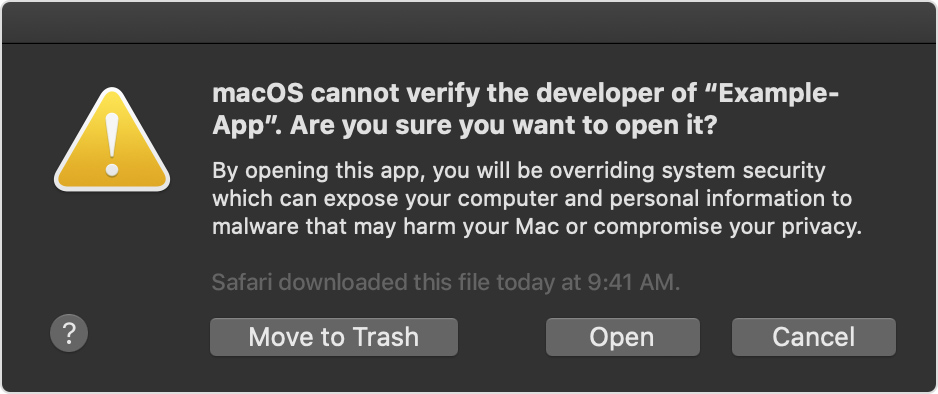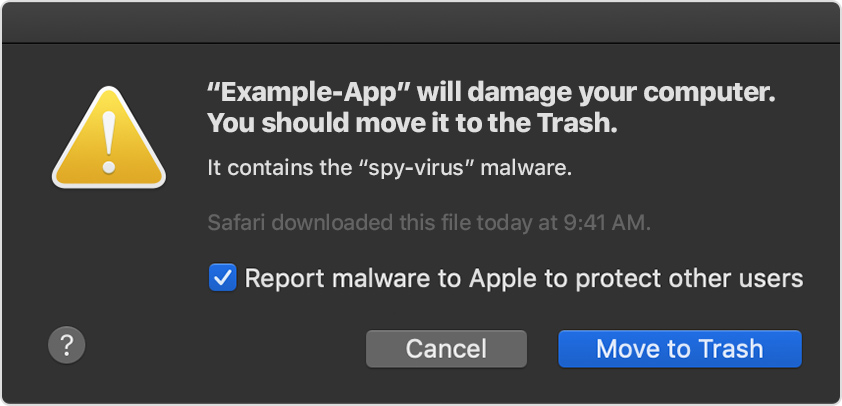-
Notifications
You must be signed in to change notification settings - Fork 857
New issue
Have a question about this project? Sign up for a free GitHub account to open an issue and contact its maintainers and the community.
By clicking “Sign up for GitHub”, you agree to our terms of service and privacy statement. We’ll occasionally send you account related emails.
Already on GitHub? Sign in to your account
macOS 10.15: Ungoogled Chromium can't be run because it's not notarized. #859
Comments
|
Hello, firstly, this issue would probably better fit in the macOS repo. About your issue:
Background: See also around 3min into the Video Advances in macOS Security, and this separate video: All About Notarization; both from the WWDC 2019 |
|
Should this be added to the ungoogled-chromium-macos README? |
|
With all due respect, saying that notarization can be circumvented via Terminal command is not a permanent solution. I found that the Terminal command described above is not even necessary. I opened the DMG file of Ungoogled Chromium, which I was able to install, but not launch. When I clicked on the icon, a message appeared that complained about the lack of notarization. I kept this message open, went to the System Preferences -> Security & Privacy -> General, then opened the lock at the bottom left corner via Admin privilege, and then was presented with an option to run Ungoogled Chromium regardless of notarization. Ungoogled Chromium then started up just fine, and continues to do so. So the Terminal is not strictly required. That being said, I go to great lengths to install your software, since I don't want to use official Chrome for universally known reasons. The hoops I had to hop through were anything but self-explanatory, and less experienced users might not be able to run Ungoogled Chromium at all. I also suspect that Apple will remove the ability to circumvent the notarization requirement eventually, meaning that your software would be permanently dead eventually on the Mac, perhaps as early as macOS 10.16 next year. The solution proposed by @kramred is a stop gap at best, and is not even viable today for less experienced users. You should look into notarization eventually, if you care about Mac users. |
|
@Peacock365, let me try to address a few points from your reply. I suggested a workaround as I still don't know what to think about notarization and I lean towards not supporting it, see the wall of text below why. It is interesting how you describe your experience as having to "hop trough hoops". I think this is exactly the perception Apple wants to create with the (new design of the) warning messages and by removing the option in the GUI to install Software from any source. You also state that you
I also think this may be one scenario that Apple is evaluating to pursue. A few remarks about that:
Ultimately, you want to be able to trust the software you run on your machines. Google Chrome seems to have crossed the line where you don't trust it any more (this applies to many of us, I would say). Notarization and the signing of applications desire to build trust as well.
In their support article Safely open apps on your Mac Apple states
Lastly, about making ungoogle chromium more accessibe to end users (who may be less tech savy):
Conclusions:
|
|
Nice writeup, but doesn't provide any answer. You say that Apple is turning macOS into a walled garden. Fine, I am not blind, I see that as well. The hoops I had to hop through are testament of it. It also adds nothing to say that Apple intends my impression to be the way it is, again, I am not blind, I see that too. You say that Apple might apply censorship via their notarization process. I think that's an alu hat theory, not sure if this is even possible... Because if they really wanted to censor stuff, there would be no way around checking the code manually, it would literally be the only way, and that would drag out the notarization process quite a bit. Until any kind of censorship is proven, I'd call that an alu hat theory. Sorry to say, you have no proof for any kind of censorship taking place, and the way the notarization process works makes it seem unlikely as well. I think the code is just scanned for known malware within a few seconds and that's it. You also mention that Apple is trying to spread FUD regarding legitimate software like Ungoogled Chromium. Could be, but fact is, the notarization process checks for known malware, and since software that isn't notarized didn't go through the process, it could potentially(!!!) contain malware. I am not thinking that about Ungoogled Chromium, but I wouldn't bet on it when it comes to other kinds of software, so it isn't exactly FUD. What I gather from your post is that you are opposed to notarization for ideological reasons, which I would classify as alu hat theories, but if they are valid to you, then that's that. Apple will eventually enforce the notarization requirement, at which point Ungoogled Chromium is dead on the Mac unless you comply with the new security standards. It's as easy as that. And even today, it is extremely difficult to install Ungoogled Chromium in macOS 10.15 Catalina. I don't know why you suggest to me to switch browsers. Apple won't enforce the notarization requirement in macOS 10.15 Catalina most likely, I am good to go for at least another year. What I was criticizing is the fact that Ungoogled Chromium becomes more and more inaccessible for standard users. I will install it as long as it's possible, until it is dead on the Mac. |
|
I think the conclusions/solutions proposed by @kramred are reasonable here.
I believe this is the ideal solution, as it reduces the amount of work that's needed by the user (and it conforms to what Apple wants). But, that also means we need to find such a person.
If the issue with notarization is with the pop-ups that get in the way, this doesn't help. But if the concern is with users questioning the trust of the binaries, then the pop-ups don't really help either. But it does make it more apparent to the user I suppose.
Also a perfectly valid conclusion, depending on what the user really wants. |
|
Closing this issue in favour of ungoogled-software/ungoogled-chromium-macos#63 |


See header. Ungoogled Chromium can't be run in any version of macOS 10.15 Catalina, as it is not notarized. Apple enforces this requirement now. Please resolve, I don't want to roll back to macOS 10.14 Mojave.
The text was updated successfully, but these errors were encountered: